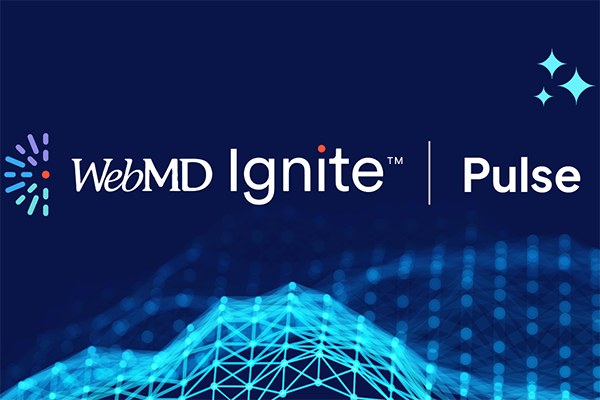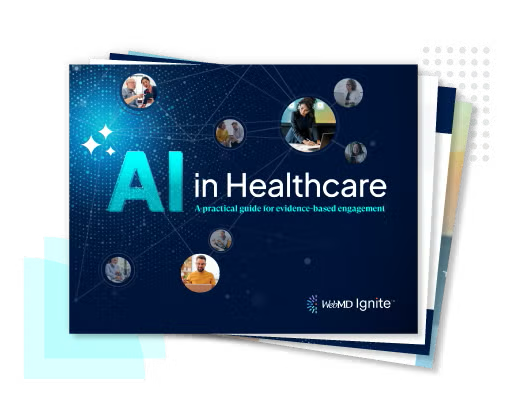Using AI for healthcare content: Best practices for delivering accurate, accessible patient education

Artificial intelligence is changing how healthcare organizations deliver patient education content — but it cannot replace the foundation of evidence-based, clinically reviewed health information that patients need. For clinical teams and health systems, the challenge has always been about reaching diverse patient populations with information that's accurate, accessible, and tailored to individual health literacy levels, languages, and needs.
Creating this type of trusted content requires medical expertise, rigorous clinical review processes, and ongoing updates to reflect the latest evidence — capabilities that take years to develop. AI offers potential to help scale and personalize this already-vetted health education, but only when it builds upon clinically sound content and maintains rigorous verification standards.
The healthcare content challenge: Scale meets accuracy
Today's healthcare consumers struggle with finding trustworthy health information when they need it. A quarter of consumers report they cannot get the care they need when they need it, which leads them to spend hours researching health questions across unreliable sources.1 Meanwhile, AI is flooding the internet with volumes of unverified healthcare content, creating what one industry expert calls "a landfill of content that's drowning out high quality, medically reviewed websites."2
This creates both a crisis and an opportunity for healthcare organizations. While AI-generated misinformation erodes public trust, healthcare systems that establish themselves as sources of verified, clinically accurate content can differentiate themselves as the trusted authorities patients desperately need.2 This trust is critical: nearly 80% of surveyed consumers said they would not return to the same healthcare provider if they had an experience where they lost trust.3 Generative AI is only effective if it is both equity-enhancing and trust-promoting — failure to deliver on either will dramatically slow adoption and limit its potential to improve patient outcomes.
For clinical teams, the stakes are particularly high. Unlike marketing content aimed at patient acquisition or brand engagement, health education content directly impacts patient outcomes. When patients receive accurate, understandable information about managing chronic conditions, following treatment plans, or making lifestyle changes, they're more likely to achieve better health results. On the other hand, inaccurate, confusing, or conflicting health information can lead to poor adherence, worsened conditions, and avoidable complications.
Where AI helps extend the reach of evidence-based patient education
When starting with evidence-based, clinically reviewed health content, AI's real value lies in its ability to help clinical teams scale and personalize that trusted information to overcome longstanding barriers to effective patient education. The technology excels at adapting verified content in several ways that directly address clinician pain points:
1. Automating routine content tasks to free clinical expertise
Healthcare providers report feeling overwhelmed by documentation responsibilities that take time away from patient care.4 AI-powered tools handle time-consuming tasks like medical scribe technology that automatically captures visit notes and summarizes patient histories. The data these tools produce can be leveraged to match patients with content that’s most relevant to them.
2. Personalizing health education for diverse populations
One of the most promising applications is AI's capacity to adapt health information for different audiences. Machine learning models can predict clinical and behavioral risks for individuals, then tailor wellness programs and educational messages to increase engagement.1 More importantly, AI can translate complex, clinically reviewed, evidence-based medical information into content that’s appropriate for varying health literacy levels, different languages, and cultural contexts. This helps clinicians and healthcare organizations reach patient and member populations who have historically faced barriers to accessing understandable health information.
This is particularly valuable for explaining follow-up care, medication instructions, and self-management strategies for chronic conditions. For example, Kaiser Permanente reported that its AI-powered patient messaging system triaged 32% of messages without requiring physician input, ensuring patients received timely information while freeing up clinician time.1
3. Supporting patient adherence and self-management
Patient engagement and compliance remain healthcare's critical "last stretch" challenge between treatment plans and actual health outcomes. When patients fail to follow treatment courses, manage their conditions, or attend follow-up appointments, even the best clinical care falls short. AI-based healthcare apps can send messaging alerts and deliver customized educational material at moments when patients need encouragement to maintain behavior changes. These tools can also remind patients about medication intake, help them check symptoms, and assist with managing chronic diseases — all supporting better adherence without requiring continuous clinical staff intervention.5
4. Improving access to current medical knowledge
For clinical decision-making, AI-enabled knowledge retrieval tools can help clinicians access peer-reviewed literature more effectively. Advanced systems use machine learning algorithms to rank search results and continuously learn from users' search behavior, making it faster to find relevant clinical evidence.6 This capability helps ensure that when patient education materials are developed by medical content experts who translate technical studies into accessible language, those materials can reflect the most current medical guidelines and research findings.
The non-negotiable requirement: Medical review and verification
AI is a tool that assists human content creators, not one that replaces them. Every piece of AI-generated healthcare content must be rooted in information that’s undergone a thorough medical review by qualified clinical professionals before reaching patients.
Healthcare content reviewers should verify several aspects of any AI-generated material: Can clinical claims be substantiated in peer-reviewed sources or authoritative medical databases? Is critical information about risks, contraindications, or specific patient populations missing? Does the content contain inherent bias that could affect health equity? Does the information align with current clinical practice guidelines?7
Establishing robust review processes
Getting medical professionals involved in content review accomplishes three essential goals: It builds stronger relationships between marketing/communications teams and clinical staff. This helps physicians promote their services and expertise while maintaining clinical accuracy and it also ensures that all content aligns with the latest medical guidelines and best practices.2 Further, one of the advantages of working with established medical content providers is access to patient education that has already undergone rigorous clinical review — eliminating the need for busy clinicians to review every piece of content before sharing it with patients.
Building trust through verified, locally relevant content
To counter the flood of AI-generated misinformation online, healthcare organizations should position themselves as sources of verified, reliable health information by partnering with health content providers who specialize in creating medically reviewed patient education.2 This approach allows healthcare systems to offer comprehensive libraries of trusted content on conditions and treatments relevant to their communities — establishing themselves as expert resources patients can depend on — without bearing the burden of creating and clinically reviewing every piece of content themselves.
Creating deep, relevant content that meets genuine patient needs and reflects local health concerns is essential for maintaining your healthcare system's reputation as a reliable resource.2 This approach starts with evidence-based, clinically reviewed patient education from trusted content providers, then uses AI to help adapt that verified information to reflect local practice guidelines, cultural relevance, and community context — allowing healthcare organizations to focus on customization rather than content creation and clinical review.
The most effective strategy combines first-hand community perspectives with medical expertise from your own physicians. This humanizes your organization and establishes it as an entity that genuinely cares about local health issues while speaking with clinical authority.2 It also creates unique content tailored specifically to your patient population — something AI alone cannot generate.
SOURCES
- McKinsey & Company, Harnessing AI to reshape consumer experiences in healthcare https://www.mckinsey.com/industries/healthcare/our-insights/harnessing-ai-to-reshape-consumer-experiences-in-healthcare
- HealthcareSuccess, How Hospitals Can Safely Use AI for Content Creation https://healthcaresuccess.com/blog/podcast-interview/how-hospitals-can-safely-use-ai-for-content-creation.html
- Deloitte, The dawn of a new health CEO, https://www.deloitte.com/content/dam/assets-zone3/us/en/docs/industries/life-sciences-health-care/2024/us-lshc-future-of-health-consumer.pdf
- Harvard Medical School - Professional, Corporate, and Continuing Education, The Benefits of the Latest AI Technologies for Patients and Clinicians https://learn.hms.harvard.edu/insights/all-insights/benefits-latest-ai-technologies-patients-and-clinicians
- National Library of Medicine - National Center for Biotechnology Information, A Review of the Role of Artificial Intelligence in Healthcare https://pmc.ncbi.nlm.nih.gov/articles/PMC10301994/#:~:text=2.4.%20Patient%20Engagement%20and%20Compliance
- National Library of Medicine - National Center for Biotechnology Information, How Artificial Intelligence is Changing Health and Health Care https://www.ncbi.nlm.nih.gov/books/NBK605950/
- Northwestern Libraries and Research Guides, Using AI Tools in Your Research https://libguides.northwestern.edu/ai-tools-research/evaluatingaigeneratedcontent#s-lg-box-33585581:~:text=for%20Librarians%20%26%20Faculty-,Evaluating%20AI%2DGenerated%20Content,-AI%2Dgenerated%20output




